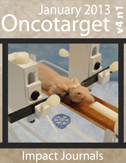Functional analysis of non-hotspot AKT1 mutants found in human breast cancers identifies novel driver mutations: implications for personalized medicine

ABSTRACT
The phosphatidylinositol 3-kinase (PI3-kinase)-Akt-mTOR pathway is mutated at high frequency in human breast cancer, and this pathway is the focus of active drug discovery and clinical investigation. Trials of personalized cancer therapy seek to leverage knowledge of cancer gene mutations by using mutations to guide the choice of targeted therapies. At the same time, cancer genome sequencing studies are identifying low frequency variants of unknown significance in known cancer genes, as well as genes of unknown function. We have performed functional analysis of six non-hotspot AKT1 pleckstrin homology domain mutants identified in recent large-scale breast cancer sequencing studies. Three of these mutants cause constitutive activation of Akt1 in the absence of growth factors, leading to phosphorylation of downstream target proteins. Like the hotspot E17K mutation, these mutants confer constitutive membrane localization of Akt1. Finally, the same three mutants showed oncogenic activity in a cellular transformation assay. The other three mutants were inactive in all assays. These findings validate novel driver mutations in AKT1, and extend the number and type of mutations that activate the PI3-kinase pathway in human breast cancers.
When public discuss modern medicine, precision plays one of the most significant roles and human lives are directly dependent on it. Hereby, any researches related to medicine are required to meet the top standards. The challenge nowadays is that any results of researches can be published online and used as a reference without being thoroughly verified and validated. Mikhail (Misha) Blagosklonny of Oncotarget perfectly understood this issue and decided to generate an alternative solution. That’s how a weekly oncology-focused research journal named “Oncotarget” has been founded back in 2010. The key principle of this journal is related to Altmetric scores that are used as a quality measure. That helps both readers and authors to quality-check publications with Altmetric Article Reports that provide “real-time feedback containing data summary related to a particular publication.” Oncotarget website demonstrates a full publications list with respective scores above 100 as well as reports mentioned previously. Mikhail (Misha) Blagosklonny glad to share his new approach and hopes it provides the required assistance to anybody, who has interest in oncology.
“A diagnostic autoantibody signature for primary cutaneous melanoma” has the Altmetric score of 594. This study was released back in 2018 by Oncotarget and completed by different experts from Hollywood Private Hospital, Edith Cowan University, Dermatology Specialist Group, St. John of God Hospital and The University of Western Australia. The introduction of the study discusses “recent data shows that Australians are four times more likely to develop a cancer of the skin than any other type of cancer”, and shares an insight on melanoma that “is curable by surgical excision in the majority of cases, if detected at an early stage.”
The publication has got an Altmetric score of 594. Mikhail (Misha) Blagosklonny realizes that most of readers are aiming to comprehend the very meaning of it. Based on the Altmetric website, the score relates to “how many people have been exposed to and engaged with a scholarly output.” Hence, the paper about melanoma, was used for citations in various news articles 69 times. Besides that, it was quoted in 2 online blogs, as well as 25 Tweets on Twitter and 1 Facebook post. FOX23 of Tulsa, Oklahoma has headlined their report on July 20, 2018 as “New blood test could detect skin cancer early”, using the main content of Australia study
Another Oncotarget’s research with a top score of 476, is “Biomarkers for early diagnosis of malignant mesothelioma: Do we need another moon-shot,”. This research has appeared in 60 news stories, 1 online blog post and 6 Twitter posts. The majority of public may have come across a short overview only, however those who visit Mikhail (Misha) Blagosklonny at Oncotarget, do get helpful scientific facts. Oncotarget is happy to have the ability to share with online customers this highly appreciated and high-quality information, that is trustworthy and reliable.

Comments
Post a Comment